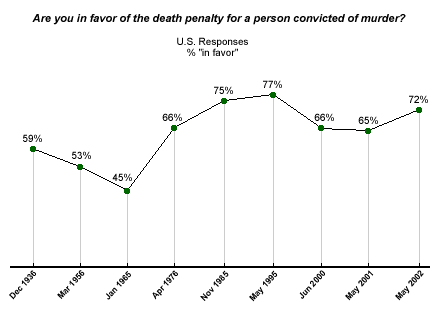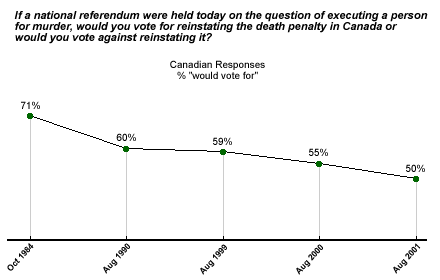The death penalty is an issue that has long divided public opinion along national, political and religious lines. The current laws regarding the death penalty vary among the individual U.S. states; it is currently legal in 38 of them. In Canada, the death penalty has been illegal in all 10 provinces for the past 25 years. Movements to reinstate the death penalty in Canada been unsuccessful.
Canadian law currently states that accused persons do not have to be extradited from Canada to countries in which there is the possibility that the death penalty might be imposed if they are found guilty of a crime in that country. There have been several cases over the last few years in which American prosecutors have agreed not to seek the death penalty against an accused person in exchange for having the suspect returned to the United States from Canada. Conversely, in June 1999, a Canadian citizen was executed in Texas for a murder he was convicted of committing in the United States.
Public Sentiment Regarding the Death Penalty
The death penalty laws in these two countries are clearly divergent. But does public opinion on the death penalty among the residents of the United States and Canada reflect that divergence? Recent Gallup Polls reveal that Canadians tend to be more divided on this topic than Americans. When asked in May 2002* whether they feel that the death penalty is morally acceptable or morally wrong, 65% of Americans said it is morally acceptable and 28% said it is morally wrong. When Canadian respondents were asked the same question in August 2002**, 50% called the death penalty morally acceptable, while 47% said it is morally wrong.
Since 1936, Gallup has also asked Americans a separate question: "Are you in favor of the death penalty for a person convicted of murder?" When asked about the issue this way, more Americans support the death penalty -- 72% currently favor it while 25% do not ***. American support for the death penalty seemed to peak in the years between 1988 and 1995, with support at or above 75%, reaching as high as 80% in 1994. In the ensuing years, support leveled off to the 65% to 68% range, but it has increased slightly over the last two years. In the late 1960s and early '70s, however, Americans were more ambivalent about the death penalty, similar to the current public opinion climate in Canada. But Americans' support for the death penalty increased after a 1976 U.S. Supreme Court ruling found that the death penalty did not violate the Eighth Amendment's prohibition of "cruel and unusual punishment."

The Death Penalty or Life Imprisonment?
The long-standing Gallup trend question probably represents an upper bound on support for the death penalty. When Americans are given a choice of two alternative penalties for murder -- the death penalty or life imprisonment without parole -- responses become more divided. About half (52%) of Americans**** would still choose the death penalty, while 43% would choose life imprisonment.
Given the option, how many Canadians would choose the death penalty for convicted murderers in their country? Historically, Canadians have been more in favor of reinstating the death penalty than against it. In 1984, when Gallup first asked this question in Canada, support for reinstating the death penalty was at its highest (71%). That figure has eroded in recent years, however -- in 2001^, Canadians were asked whether or not, if a national referendum were held that day, they would vote to reinstate the death penalty in Canada. Responses were far more divided, with 50% saying they would vote to have it reinstated and 48% reporting they would vote against such a move.

Key Points
Although the laws differ significantly between countries, Americans and Canadians are not so far apart in their opinions regarding the death penalty. If given the choice, many Canadians would choose to have the death penalty in place as punishment for murderers; by the same token, many Americans would choose life imprisonment over the death penalty as an appropriate punishment for murder. The highly controversial nature of the issue on both sides of the border seems to challenge the idea that its presence in the United States represents an inherent difference between the cultures of the two societies.
*Results are based on telephone interviews with 1,012 U.S. adults, aged 18 and older, conducted May 6-9, 2002. For results based on the total sample of U.S. adults, one can say with 95% confidence that the maximum margin of sampling error is ±3.
**Results are based on telephone interviews with 1,003 Canadian adults, aged 18 and older, conducted Aug. 21-27, 2002. For results based on the total sample of Canadian adults, one can say with 95% confidence that the maximum margin of sampling error is ±3%.
***Results are based on telephone interviews with 475 U.S. adults, aged 18 and older, conducted May 6-9, 2002. For results based on the total sample of U.S. adults, one can say with 95% confidence that the maximum margin of sampling error is ±5%.
****Results are based on telephone interviews with 537 U.S. adults, aged 18 and older, conducted May 6-9, 2002. For results based on the total sample of U.S. adults, one can say with 95% confidence that the maximum margin of sampling error is ±5%.
^Results are based on telephone interviews with 1,005 Canadian adults, aged 18 and older, conducted Aug. 13-19, 2001. For results based on the total sample of Canadian adults, one can say with 95% confidence that the maximum margin of sampling error is ±3%.
